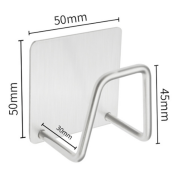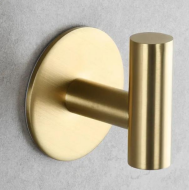Which Materials Are Best for Bathroom Accessories?
Bathroom accessories—like towel bars, soap dispensers, toothbrush holders, and shower caddies—face daily exposure to moisture, humidity, and cleaning products. Choosing the right materials ensures these items remain functional, attractive, and durable over time. The best materials for bathroom accessories resist rust, corrosion, and water damage while fitting your style and budget. This guide explores the top materials for bathroom accessories, explaining their benefits, drawbacks, and ideal uses to help you make informed choices.
Stainless Steel: Durable and Rust-Resistant
Stainless steel is one of the most popular materials for bathroom accessories, prized for its strength and resistance to moisture. It is an alloy of iron, chromium, and other metals, with chromium creating a protective layer that prevents rust.
Why It Works for Bathroom Accessories:
- Rust Resistance: The chromium in stainless steel forms a barrier against water and oxygen, stopping rust from forming even in humid bathrooms. This makes it ideal for items like towel bars, shower caddies, and toilet paper holders that stay in contact with moisture.
- Durability: Stainless steel is strong and scratch-resistant, standing up to daily use without dents or damage. It won’t warp or crack, even with temperature changes from hot showers.
- Easy Maintenance: It cleans easily with soap and water, and most stains or water spots wipe away quickly. Unlike some metals, it doesn’t require special polishes to maintain its appearance.
- Style Versatility: Available in finishes like brushed, polished, or matte, stainless steel fits modern, industrial, or transitional bathroom styles. Brushed stainless steel hides fingerprints, while polished adds a sleek, reflective look.
Considerations:
Lower-grade stainless steel (with less chromium) may still rust over time, especially in very humid bathrooms. Look for 304-grade stainless steel, which is highly corrosion-resistant and ideal for bathroom accessories. It is slightly more expensive than other metals but offers long-term durability.
Lower-grade stainless steel (with less chromium) may still rust over time, especially in very humid bathrooms. Look for 304-grade stainless steel, which is highly corrosion-resistant and ideal for bathroom accessories. It is slightly more expensive than other metals but offers long-term durability.
Brass: Timeless and Long-Lasting
Brass is a classic material for bathroom accessories, valued for its elegance and ability to develop a rich patina over time. It is an alloy of copper and zinc, with natural resistance to corrosion when properly finished.
Why It Works for Bathroom Accessories:
- Corrosion Resistance: Brass is naturally resistant to moisture, making it suitable for humid environments. When coated with a protective finish (like chrome, nickel, or oil-rubbed bronze), it becomes even more durable, resisting tarnish and rust.
- Strength: Solid brass is heavy and sturdy, ensuring bathroom accessories like towel bars or robe hooks stay securely mounted without bending or loosening.
- Aesthetic Appeal: Brass adds warmth and sophistication to bathrooms. Unfinished brass develops a warm, aged patina, while plated brass (chrome or nickel) offers a shiny, modern look. Oil-rubbed bronze finishes add a vintage, rustic touch.
- Compatibility: Brass works with a wide range of bathroom styles, from traditional to contemporary, making it a versatile choice.
Considerations:
Solid brass bathroom accessories are more expensive than stainless steel or plastic. Unfinished brass requires regular polishing to prevent tarnishing, though many homeowners appreciate the natural patina it develops. Plated brass may chip over time if the finish is scratched, exposing the base metal to moisture.
Solid brass bathroom accessories are more expensive than stainless steel or plastic. Unfinished brass requires regular polishing to prevent tarnishing, though many homeowners appreciate the natural patina it develops. Plated brass may chip over time if the finish is scratched, exposing the base metal to moisture.
Plastic: Affordable and Versatile
Plastic is a budget-friendly option for bathroom accessories, available in a variety of styles, colors, and designs. Modern plastics like polypropylene, ABS, and acrylic are durable and moisture-resistant, making them practical for everyday use.
Why It Works for Bathroom Accessories:
- Water Resistance: Plastic is non-porous, so it doesn’t absorb water or rust. This makes it ideal for items like soap dishes, toothbrush holders, and shower caddies that come into direct contact with water.
- Affordability: Plastic bathroom accessories are inexpensive, making them easy to replace if they wear out or if you want to update your bathroom’s style.
- Lightweight and Easy to Install: Lightweight plastic items are simple to mount or move, perfect for renters or anyone who wants easy DIY installation.
- Design Flexibility: Plastic can be molded into various shapes and colored to match any decor, from bright, playful designs for kids’ bathrooms to sleek, neutral tones for adult spaces.

Considerations:
Low-quality plastic may crack or warp over time, especially when exposed to high heat (like near a shower). Choose thick, high-density plastics (like acrylic) for better durability. Plastic is less scratch-resistant than metal, so it may show wear in high-use areas. It is best for accessories that don’t need to support heavy weight, like soap dispensers or toothbrush holders.
Low-quality plastic may crack or warp over time, especially when exposed to high heat (like near a shower). Choose thick, high-density plastics (like acrylic) for better durability. Plastic is less scratch-resistant than metal, so it may show wear in high-use areas. It is best for accessories that don’t need to support heavy weight, like soap dispensers or toothbrush holders.
Ceramic: Stylish and Easy to Clean
Ceramic is a popular material for decorative bathroom accessories, known for its smooth surface, vibrant colors, and easy maintenance. It is made from clay fired at high temperatures, creating a hard, non-porous material.
Why It Works for Bathroom Accessories:
- Moisture Resistance: Ceramic is non-porous, so it doesn’t absorb water or harbor mold. This makes it great for soap dishes, toothbrush holders, and vanity trays that sit on wet countertops.
- Easy to Clean: Its smooth surface wipes clean with a damp cloth, and it resists stains from soap, toothpaste, or cosmetics.
- Aesthetic Variety: Ceramic bathroom accessories come in endless designs, from hand-painted patterns to solid colors and glossy or matte finishes. They add a decorative touch, making them ideal for enhancing bathroom style.
- Durability: High-quality ceramic is chip-resistant and long-lasting, though it may break if dropped.
Considerations:
Ceramic is heavy, so it’s not ideal for wall-mounted accessories like towel bars. It can crack under extreme temperature changes, so avoid placing it near heat sources. While durable, it is more fragile than metal or plastic, so handle with care. Ceramic bathroom accessories are moderately priced, with decorative or handcrafted options costing more.
Ceramic is heavy, so it’s not ideal for wall-mounted accessories like towel bars. It can crack under extreme temperature changes, so avoid placing it near heat sources. While durable, it is more fragile than metal or plastic, so handle with care. Ceramic bathroom accessories are moderately priced, with decorative or handcrafted options costing more.
Glass: Sleek and Modern
Glass adds a luxurious, modern touch to bathroom accessories, with its transparent or frosted appearance creating a clean, airy look. Tempered glass is the best choice, as it is stronger and safer than regular glass.
Why It Works for Bathroom Accessories:
- Moisture Resistance: Glass is non-porous and water-resistant, making it suitable for items like soap dishes, vanity trays, or shower shelves. It doesn’t rust or corrode, maintaining its appearance in humid conditions.
- Sleek Aesthetic: Clear or frosted glass complements modern and minimalist bathrooms, creating a sense of space and elegance. It pairs well with metal finishes like chrome or brass.
- Easy to Clean: Glass wipes clean easily, though it may show water spots. Using a glass cleaner helps keep it streak-free.
Considerations:
Glass is fragile and can shatter if dropped, so it’s not ideal for high-traffic bathrooms or households with children. Tempered glass is stronger and breaks into small, safe pieces, making it a better choice than regular glass. Glass bathroom accessories are often more expensive than plastic or ceramic and require careful handling to avoid scratches or chips.
Glass is fragile and can shatter if dropped, so it’s not ideal for high-traffic bathrooms or households with children. Tempered glass is stronger and breaks into small, safe pieces, making it a better choice than regular glass. Glass bathroom accessories are often more expensive than plastic or ceramic and require careful handling to avoid scratches or chips.
Stone: Natural and Luxurious
Natural stones like marble, granite, or travertine bring a high-end, natural look to bathroom accessories. These materials are durable and add texture and elegance to any space.
Why It Works for Bathroom Accessories:
- Durability: Natural stone is hard and scratch-resistant, standing up to daily use. It is heat-resistant, making it suitable for placing hot items like hair tools on vanity trays.
- Unique Appearance: Each stone piece has unique veining and colors, adding a one-of-a-kind touch to bathroom decor. Marble offers classic elegance, while granite provides a more rugged, natural look.
- Moisture Resistance: When sealed properly, natural stone resists water absorption, preventing stains from soap or water.
Considerations:
Natural stone is porous, so it requires regular sealing (every 6–12 months) to maintain water resistance. It is heavy, making it unsuitable for wall-mounted accessories. Stone bathroom accessories are expensive, with marble and granite being among the priciest options. They are best for homeowners seeking a luxurious, natural look and willing to invest in maintenance.
Natural stone is porous, so it requires regular sealing (every 6–12 months) to maintain water resistance. It is heavy, making it unsuitable for wall-mounted accessories. Stone bathroom accessories are expensive, with marble and granite being among the priciest options. They are best for homeowners seeking a luxurious, natural look and willing to invest in maintenance.
FAQ
What material is best for shower caddies?
Stainless steel or rust-resistant plastic is best for shower caddies. They resist water damage and rust, even with constant exposure to shower moisture. Look for 304-grade stainless steel for maximum durability.
Are brass bathroom accessories better than stainless steel?
Brass offers a timeless, elegant look and develops a patina, while stainless steel is more affordable and low-maintenance. Both are durable, but brass may require more upkeep (polishing) if unfinished.
Can plastic bathroom accessories last long?
Yes, high-quality plastic (like polypropylene or acrylic) can last for years in bathrooms. Choose thick, sturdy plastic and avoid low-quality options that crack easily.
How do I prevent metal bathroom accessories from rusting?
Choose rust-resistant metals like 304 stainless steel or brass with protective finishes. Clean them regularly to remove moisture, and avoid harsh cleaners that strip protective coatings.
Is ceramic good for bathroom accessories in humid areas?
Yes, ceramic is non-porous and moisture-resistant, making it ideal for humid bathrooms. Just avoid dropping it, as it can chip or break.


